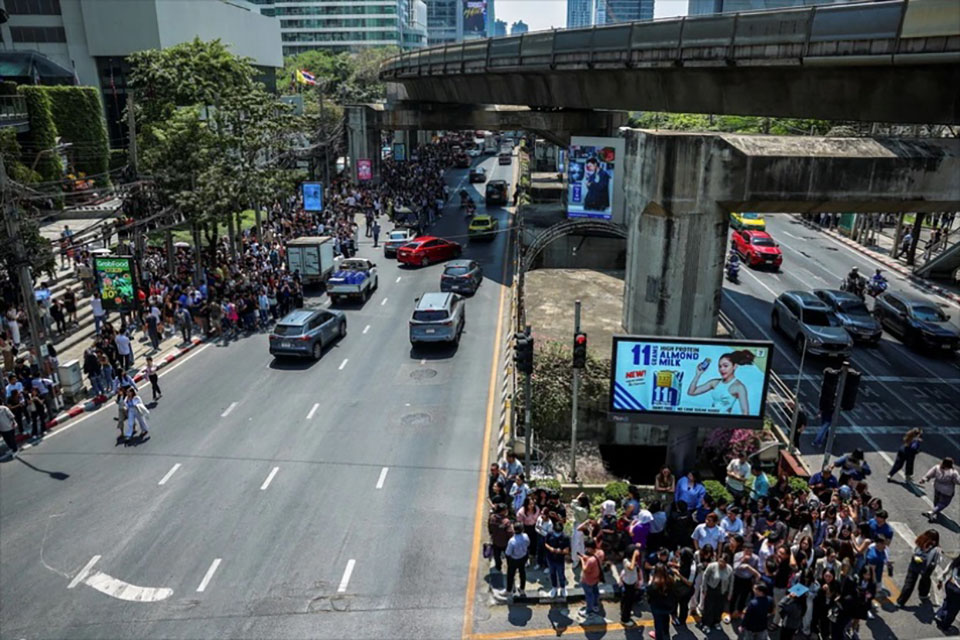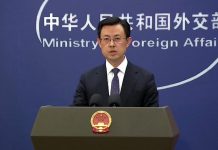
BANGKOK, Thailand – An 8.2 magnitude earthquake struck Myanmar with tremors felt across Thailand, particularly in Bangkok, making it the most powerful quake ever experienced in the capital. The earthquake caused severe shaking that impacted high-rise buildings, including condominiums, office towers, and hotels. One particularly devastating event occurred at a high-rise building under construction near Chatuchak Market, which collapsed, resulting in both injuries and fatalities.
This seismic event has raised significant concerns about the stability and safety of tall buildings in Bangkok, especially in the condominium market, which is valued at over 458.39 billion baht. The collapse of the building and the extensive damage to other structures has amplified public anxiety about the integrity of high-rise buildings and their ability to withstand such natural disasters. This uncertainty has created a ripple effect across the real estate market, with many potential buyers now hesitant to invest in condos, fearing further tremors and possible structural failures.
The condominium market, a significant part of Thailand’s real estate sector, is currently facing a crisis. Following the earthquake, there are concerns that the aftershocks may continue, further undermining the stability of buildings that were already vulnerable due to aging infrastructure or inadequate design. The market, already struggling from external factors like economic slowdown and oversupply, now faces the added burden of reduced consumer confidence.
In response, the government must urgently take action to reassure the public and investors. Experts have called for the implementation of stricter construction regulations for high-rise buildings to ensure that they can withstand seismic activity in the future. The adoption of earthquake-resistant building technologies and materials is essential to improving the safety and durability of condominiums. Without such measures, the market could face prolonged stagnation.
The Thai government’s role in revitalizing the real estate market cannot be overstated. Immediate steps need to be taken to restore consumer confidence and improve the safety standards of high-rise buildings. The government should consider the following measures:
Stronger Construction Regulations: The government must set clear, rigorous standards for high-rise buildings, including mandatory seismic testing and certification for new constructions and existing structures. This will ensure that all buildings are designed to resist earthquakes and protect the lives of residents.
Safety Checks on Existing Buildings: Comprehensive inspections should be conducted on all high-rise buildings, especially older ones, to assess their structural integrity. For buildings that are found to be vulnerable, the government could offer financial assistance or low-interest loans to property developers to support retrofitting efforts.
Public Safety and Communication: It is crucial for the government to provide transparent, accessible information about the steps being taken to secure buildings and improve safety standards. Public education campaigns can help mitigate fears and reassure the public that their homes and investments are being safeguarded.
Financial Support for Developers: Developers who want to improve the safety features of their projects should be given access to special financial support, such as grants or loans, which would help them upgrade buildings to meet earthquake-resistant standards. This financial backing would allow the property sector to recover more swiftly and help prevent any market collapse.
Promotion of Earthquake-Resistant Technologies: The government should invest in and promote research into innovative construction techniques that increase the earthquake resistance of buildings. Partnerships with universities, research institutions, and the private sector could yield new technologies that will make high-rise construction safer and more sustainable.
Earthquake Early-Warning System: In the long term, the Thai government could invest in a national earthquake early-warning system. This would give citizens and property developers advanced notice of seismic activity, allowing for timely evacuations and emergency responses, ultimately saving lives and minimizing damage.
While the immediate aftermath of the earthquake has created uncertainty in the condominium market, there is potential for recovery if the right measures are implemented. The recent relaxation of Loan-to-Value (LTV) limits, effective from May 1, 2025, is a positive step for stimulating investment in the real estate sector. However, unless the concerns about safety and building quality are addressed, the potential of these policy changes could be significantly diminished.
The government’s commitment to updating construction standards and ensuring high-rise buildings are safe in the face of natural disasters is crucial for rebuilding confidence in the market. If these changes are enacted swiftly and effectively, they can help the condominium market regain stability, protecting both buyers and developers while ensuring that Bangkok’s skyline remains both impressive and, most importantly, safe.










